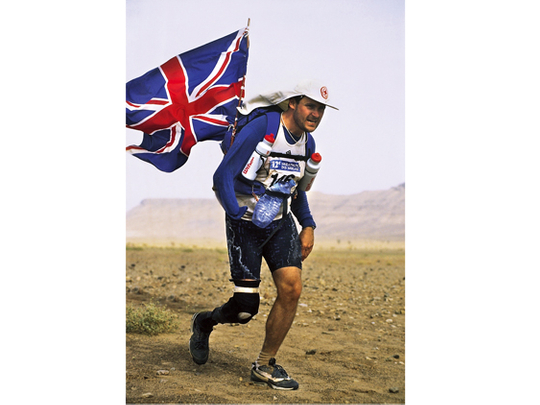
There is a crisis at the office. A big one. The kind of thing that involves people running around with their arms in the air. You hear screaming, too, and suddenly you realise that something from your deepest, darkest nightmares is coming true. What happens next, say psychologists, has a lot to do with your “mental toughness”, your personal reservoir of fortitude that will help dictate whether your reaction is to curl up in a ball, go running for the exits, or round up your colleagues James Bond-style and triumphantly lead them to safety.
It’s impossible to know how you’ll react in an emergency until you’re actually in one, but one thing we can do is take inspiration – and hopefully some encouragement – from those who have already been there; the survivors. Unlike Daniel Craig as the fictitious ultra-suave and mega-tough Bond, these people really stared horror in the face, tapped into a well of courage they didn’t know they had, and got on with it.
Where others may have faltered, they found a way to make it through. And in many cases, the stocks of mental toughness that helped them through their crises didn’t run out once they’d overcome their initial ordeal – many of them reach out and grab another helping every single day.
Ex-British Army officer Chris Moon is as tough as men get. He left the forces to clear landmines in Cambodia for a charity called the Halo Trust, a perilous enough job in itself, but nothing could have fully prepared him for the mental torture of being kidnapped by the Khmer Rouge.
Chris was one of the few Westerners ever to be released by the regime, but fate had even more in store for him in 1995 when he lost an arm and a leg in a landmine explosion. “I was running a programme in Mozambique and was walking back up a safe lane where all the landmines had been removed,” says Chris, his mind lingering back to the day that would change his life forever. “Something felt wrong, the hairs on the back of my neck stood up, and then, bang, it happened. It was the loudest bang I’ve ever heard. I had my right leg blown off immediately and also lost my right hand.”
Incredibly, Chris didn’t panic; he got on with the job. “I preach realism,” he shrugs. “You have to look at the reality of the situation and see things accurately and objectively. In Mozambique that meant I needed to assess my injuries, see how bad they were, understand what had happened, keep the guys down the lane and try and carry on doing my job.”
Chris’s road to recovery was a long one, but anyone who knew him would have put money on him facing it with courage and dignity because he had demonstrated his mental toughness so many times before. More than that, he turned what happened into a positive and is now a successful motivational speaker (see www.chrismoon.co.uk). Today, he helps businessmen go the extra mile and challenges their ideas of limitation.
He also argues that most people have the capacity to turn difficult events around if they have the mind to. “After the accident, I worked hard on making a choice,” Chris says. “Focusing on what I had and not what I had lost. It required a great deal of mental discipline, and even though I now have to work three times harder to do everything I used to, I’m lucky because I can still do everything.”
It is the ultimate winner’s mindset. And it’s not just words – Chris, 50, really can do anything, such as run in The Marathon des Sables, a gruelling six-day endurance event arguably the toughest on the planet. In 1997, he became the first amputee to complete it.
Getting up again
Scott Rigsby is, on the face of it, less of a natural-born winner than the military-minded Chris. Still a teenager at college when he lost both legs in a horrific road accident, the young American spent the next 12 years being “a professional patient”. He knew he’d hit rock bottom when he found himself “bawling my eyes out on my parents’ kitchen floor.”
Salvation came in the most unlikely of places – a physical challenge that makes even superfit athletes shake with fear. It was also something that friends of the then overweight double-amputee thought was simply impossible: Scott had decided he was going to be the first person with two prosthetic legs to compete in the Hawaiian Ironman.
This triathlon takes place in some of the most beautiful countryside on earth. But it’s also the last place you want to be doing anything physical: part of the event’s 180-kilometre bike ride takes you through Hawaii’s brutally humid lava desert. There’s also a 3.8-kilometre swim in the ocean and a 42-kilometre run to contend with. But once his mind was made up, Scott was unshakable.
“I didn’t focus on the insurmountable odds against me,” he says. “I focused on what I had going for me – which was that I knew how to run. I did that for two months and then I had to figure out a way to swim, so I contacted the local high school coach and told him what I wanted to do.” Less than two years after he started training, Scott completed his first Ironman, having discovered that he possessed levels of mental toughness that were truly astounding.
Never giving up
And yet he is far from unique. Stories abound of heroic deeds and mesmerising feats of survival. Take Steven Callahan, who survived on a 1.8-metre life raft for 76 days after his sailboat went down in the Atlantic. Struggling to make water from a rickety solar still and surrounded by sharks, he never knew when his ordeal might end. But he dug in. He set a routine for himself and stuck to it.
On the 76th day of floating in the Atlantic, on April 20, 1982, he spotted lights on the island of Marie-Galante, south east of Guadeloupe. He was picked up by fishermen just offshore. They were drawn to him by birds hovering over the raft. During the ordeal, he faced sharks, raft punctures, equipment deterioration, physical deterioration, and mental stress. “I could navigate, I could keep a log, I could catch fish,” he says. “For all survivors it’s important to maintain whatever routine you had before, and if that’s not possible, to create new ones.”
It’s an insightful sliver of advice from a man who had the spectre of death hanging over his every move for two-and-a-half months – but there’s more to Steven than that. When the chips were down – as they were on a daily basis as his raft tore, his water supplies dwindled and he drifted away from shipping lanes – he simply kept going. How many of us would have lasted so long? When being rescued seems such a slender dream, would you just give up?
Dubai students face up to pressure
Less dramatic conundrums than these, perhaps, were behind the creation of the new Mental Toughness Centre at Dubai Women’s College, launched last October with the aim of furthering research into mental toughness and better preparing young people for the challenges of life. “How do we get young people to be mentally tough?” pondered Dr Howard Reed, Director of DWC, at the Centre’s opening. “As people go through this crazy world we live in, they don’t have the platform to develop mental toughness, so they rely on their brands and their fancy phones and cars to tell them who they are.”
The centre’s aim is more about helping students to deal with stress and pressure than equipping them with practical survival skills in the event of an emergency, but the principle is basically the same: a positive, winner’s mentality can set you up for life. “There is likely both a genetic predisposition and a learned component that contributes to why some people seem to have more mental toughness than others,” explains American psychologist Dr Joseph Cilona. “Some people are more sensitive to things like stress and anxiety, while others are less so.
Those with increased sensitivity can be more vulnerable and influenced by physical and emotional discomfort, and also unable to maintain focus and effectiveness in challenging situations.” As for the ‘learned component’, Dr Cilona says that we often adopt levels of toughness that were modelled to us during our upbringing. It’s the old nature/nurture story – but as the DWC is hoping to prove, the brain can be reprogrammed.
Vaughn Ripley, author of the book Survivor, is an American haemophiliac who was given just two years to live in his late teens when a batch of bad blood infected him with both the HIV virus and Hepatitis C. His reaction to the news was far from calm and measured – by his own admission he “went bonkers” – but he was able to change.
Still alive after two years of abusing substances, he made the decision that he wanted to die fighting and on his own terms. He stepped off the downward spiral. And now, more than 25 years later, he’s alive, well – and planning on making it to the age of 86. “I think it all boiled down to willpower,” he says. “I figured out a lot of ways to stay mentally positive, like when I took my 22 pills every day I stopped thinking, ‘I’m taking these because I’m dying’ and started to think, ‘These pills are improving my strength and healing my body’. I don’t think that anyone is incapable of doing things that will change their life if they really want to.”
People can change
Perhaps, then, that’s exactly what mental toughness really is: it’s taking the decision to succeed when the chips are down. To not give up. To find the positive spin. Which means, of course, that you might already have an idea about your own levels of mental toughness – using career success, personal triumphs and relationships as guidelines. The old grey matter might be made of sterner stuff than you realised.
Even so, as miraculously recovered Indian cricketer Yuvraj Singh discovered after his battle this year with a cancerous tumour in his lung, it does sometimes take a crisis to discover your inner mettle. “I definitely feel stronger, you can’t feel stronger than this,” he told reporters in June. “It’s changed my perspective on life and now I’m just a better person. I understand better what life means now.”
If the bold words of people like Yuvraj, Vaughn and landmine survivor Chris Moon have paradoxically left you convinced that your own response to an emergency would have more in common with the ostrich than the tiger, don’t despair. Dr Peter Clough, a leading authority on mental toughness who was asked to speak at the opening of the DWC’s new centre, tells us: “You can develop your toughness. It’s done by operating outside of your comfort zone – namely doing things that make you feel uncertain, but not doing stuff that really scares you.”
There are a set of skills to master at home, including positive thinking, visualisation – where you see yourself succeeding – and anxiety control, a key component of which is breathing. “All these skills have to be learned and practised,” says Dr Clough, “but with time and effort, you can learn to deal with stress and, perhaps, turn it into a positive.” It’s got to be worth a go.
Why be a lamb when you could be a lion – though you might not know how successful you’ve been until the next time the office has one of its out-of-the-blue fire drills. If you find yourself first on your feet, efficiently manhandling your bewildered colleagues towards the fire escape, it will have been worth every effort.












